
Unpacking the Hong Kong protests factor in Taiwan’s election and the fate of ‘one country, two systems’
- Stories from protesters on the ground have only hardened Taiwan’s determination to distance itself from China
- In the fourth of a five-part series, we look at the impact the civil unrest in Hong Kong has had on the presidential race on the self-ruled island
Taiwan president Tsai Ing-wen may be using the Hong Kong protests as a cautionary tale for the self-ruled island against any encroachment by mainland China. But the narrative is being reinforced by real-life stories on the ground.
But, for ordinary Taiwanese, seeing how the Hong Kong protesters themselves have taken refuge in their city has driven home more powerful lessons, observers familiar with the movement said.
Hong Kong lawyer Daniel Wong Kwok-tung is among them. He has been assisting a group of about 20 such protesters whom he said were enduring hardship “wandering from place to place” on the island. Some were making do on US$1.50 a meal, he said, fighting back tears.
“They are in very poor psychological condition and some have to see doctors.”
He shared with the Post letters they penned for supporters in Taiwan and back home.
“Over months in Taiwan, I have been consumed by a sense of self-guilt. Looking at how comrades in Hong Kong have been injured, arrested and sacrificed, I feel that I do not deserve to be staying in such a peaceful and safe place in Taiwan,” wrote one of them.
Another wrote: “My life has settled down here. I don’t feel happy but I am at ease, finally. ‘Safety matters more than anything’ – that’s what I think … I am grateful for the warmth and friendliness of the people of Taiwan.
“Liberate Hong Kong; revolution of our times! Wish we could all be unmasked and gather one day, take care!”
From landslide win to uphill task for Taiwan presidential hopeful
To Wong, these letters showed the sacrifices being made for the larger cause of democracy. The lawyer is in talks – which he did not want to elaborate on – on the visa status of these protesters. They had not jumped bail, he insisted, but were on extended tourist visas, some for as long as five months, as they feared arrest back in Hong Kong.
“They are young people with a supposedly bright future but now they’ve had to leave home and be away from their families,” he said.
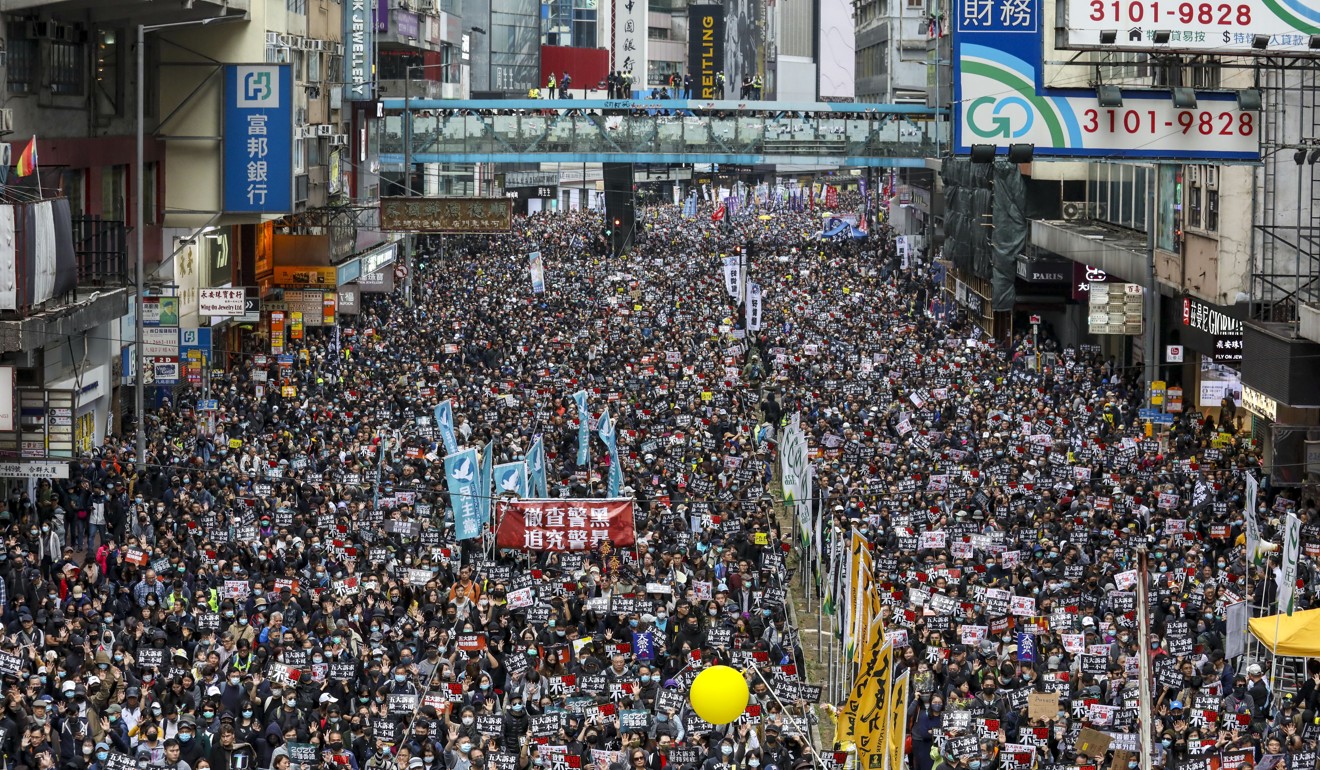
They were walking proof of how Beijing had instilled fear and “could sweep away all our autonomy”, Wong claimed.
Apart from volunteers such as Wong, churches and social welfare groups in Taiwan are also helping the protesters. For example, the Chi-Nan Presbyterian Church in Taipei has offered humanitarian assistance to some 200 of them.
Many remain traumatised, Reverend Huang Chunsheng said. Some could still “smell tear gas, and some jumped out of their beds during the middle of the night in fear police were coming” for them, according to Huang.
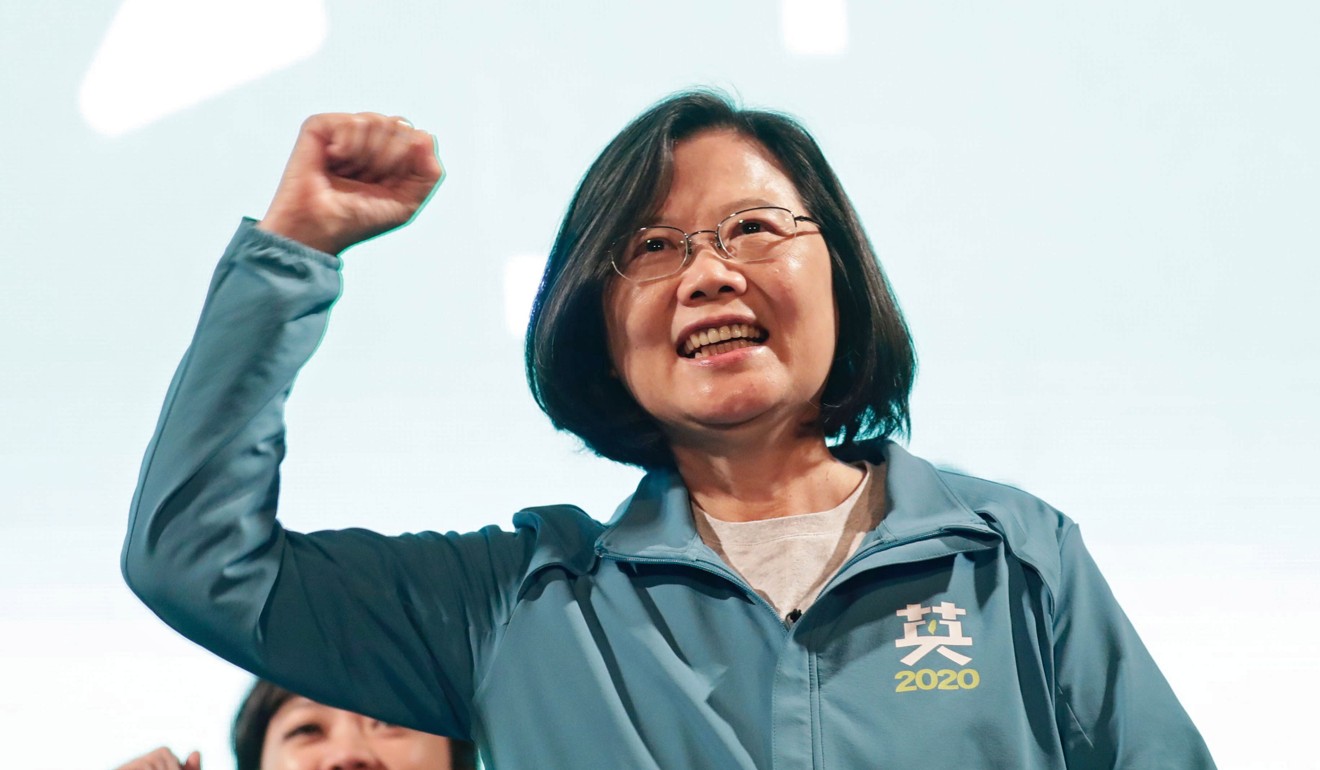
It is stories such as these being shared on the ground that add to the climate of “never let it be us” among Taiwanese voters, analysts said, and this is how the Hong Kong factor has shaped the elections, providing a stark contrast of how the “one country, two systems” model could never work for Taiwan.
Tsai has been using the stories of Hong Kong protesters in her campaign speeches to drive home this message. During the last televised debate of the three presidential candidates, she read out excerpts from a letter she said she had received from a youngster in Hong Kong.
Taiwan’s Tsai Ing-wen poised to complete political comeback
Quoting the letter writer, she said: “‘I ask that Taiwan’s people do not believe the Chinese Communists, don’t believe any pro-Communist official, and don’t fall into China’s money trap’.
“If the young generation in Taiwan has to take to the streets 20 years later, Hong Kong by then can no longer demonstrate how to fight any more.”
Describing the words as mixed with blood and tears, Tsai urged Taiwanese people to decide whether “a democratic and free lifestyle can continue” with their votes.
Few doubt that the Hong Kong protests have boosted the political fortunes of Tsai as opinion polls show her populist rival Kaohsiung Mayor Han Kuo-yu, from the mainland-friendly Kuomintang (KMT) trailing her by more than 20 points.
Her reversal in fortunes came within months of the protests beginning. In January last year, she resigned as chairwoman of the pro-independence Democratic Progressive Party (DPP), after a humiliating electoral defeat the previous November. Her party retained only six of the 13 cities and counties it used to control, compared with the 15 won by the KMT.
Hsiao Tu-huan, a researcher at the Centre for Cross-Strait Relations in Tamkang University in Taiwan, said Tsai had benefited tremendously from the Hong Kong unrest.
Beijing claims Taiwan parties have explored ‘one country, two systems’
“The DPP suffered a crushing defeat in local elections in November last year. But the controversy over the now-withdrawn extradition bill raised the concerns of Taiwanese about the developments in Hong Kong and the cross-strait relationship,” said Hsiao, also a board member of Taiwan Network for Free Elections.
Tsai used the Hong Kong unrest to play up a “sense of crisis” if she were not re-elected that the democratic island of 23 million people risked being swallowed up by Beijing, which considers it part of its own territory that must one day be brought under its fold, by force if necessary.
Many said the Hong Kong government led by Carrie Lam Cheng Yuet-ngor and its pro-Beijing allies should share the blame for helping Tsai pull the self-ruled island further away from the mainland.
Hong Kong gave Tsai ‘ammunition’
Tam Yiu-chung, the city’s sole deputy to Beijing’s top legislative body, the standing committee of the National People’s Congress, agreed the extradition bill had been like “giving ammunition” to Tsai and her DPP.
“In hindsight, yes, you may argue that the Hong Kong government lacked political sensitivity over the issue … raising this before the elections,” he said.
Tam’s party, the Democratic Alliance for the Betterment and Progress for Hong Kong (DAB), was the first party to urge the government to plug the legal loophole with the extradition bill, as its chairwoman Starry Lee Wai-king and lawmaker Holden Chow Ho-ding first met the press with the mother of the murder victim Poon Hiu-Wing, 20, in February 2019.
Taiwanese president Tsai denies ‘using’ Hong Kong protests for election
“We were doing our job as elected lawmakers to reflect the opinion of citizens who supported the extradition bill,” Starry Lee told the Post last week. “I believe I am also among those who expressed in public, at a rather early stage, that we understood the situation if the chief executive had to withdraw the bill.”
Zhu Songling, a professor at the Institute of Taiwan Studies at Beijing Union University, said given such politicking it was unfair to lay all the blame on the Hong Kong government. The Chan case would have been exploited during elections even without the bill.

“Pro-independence forces would use the controversy to serve their political agenda no matter how the Hong Kong government handled it,” Zhu said.
Tsai had used the confluence of these events to establish herself as a defender of Taiwan sovereignty after rejecting Xi’s call.
Whether it was Hong Kong or some other trigger, Zhu said: “Taiwan authorities have never made a positive response since Beijing put forward the one country, two systems in the early 1980s.”
One country, two systems – never in Taiwan?
At the core of the Hong Kong factor in the Taiwanese elections is the fate of one country, two systems principle first articulated by late paramount leader Deng Xiaoping.
“The one country, two systems formula has lost further appeal among Taiwanese in the wake of the protests against the extradition bill in Hong Kong,” Hsiao said. “Many young people in Taiwan feel there is a stronger need to resist the mainland’s interference in Taiwan’s politics.”
Ho Ming-sho, professor with the National Taiwan University’s sociology department, agreed the Hong Kong protests had reinforced the negative image of the one country, two systems principle among many Taiwanese, and had dealt a blow to Han Kuo-yu’s campaign.
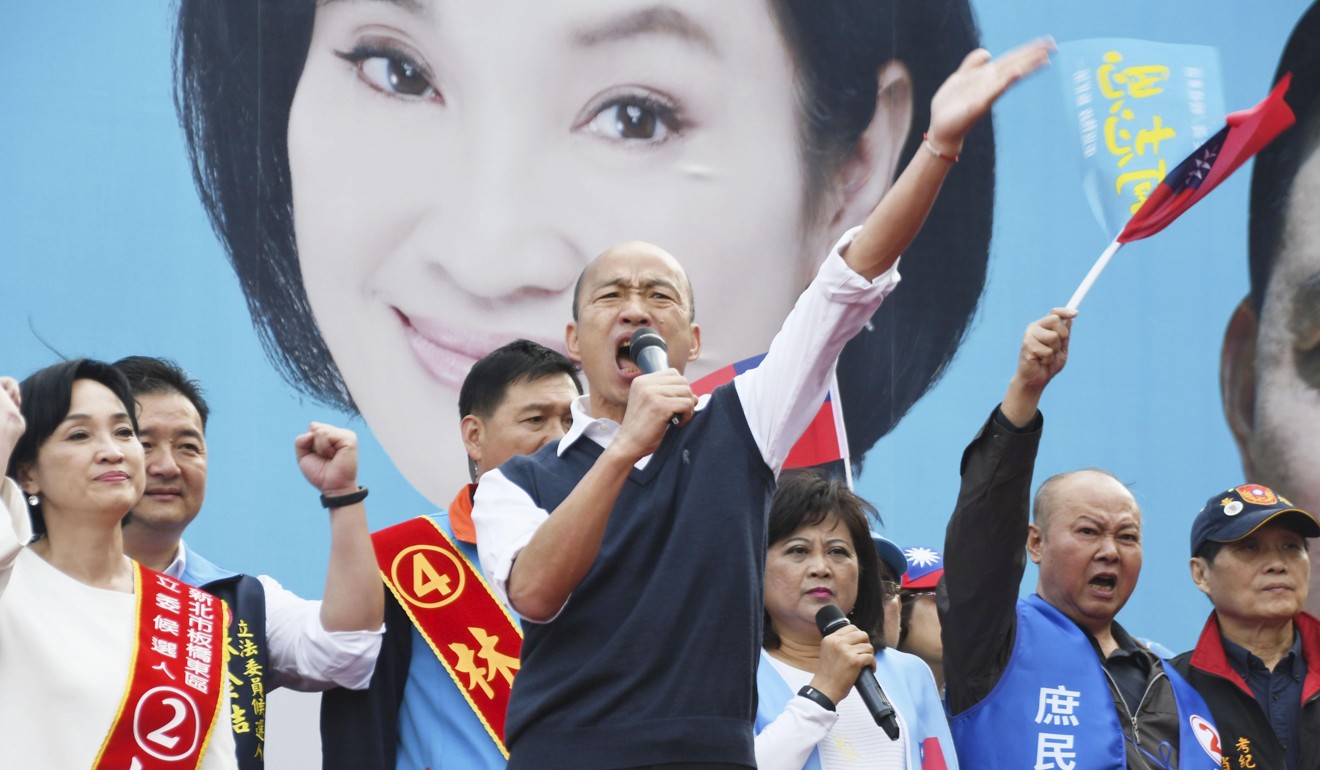
“According to several opinion polls, Han’s popularity peaked in July but slid since then,” Ho said, adding that the reversal of Han’s fortunes also stemmed from other factors, such as his own performance after his election as Kaohsiung mayor last year.
Han, seen as Beijing’s favoured candidate in the presidential race because of his friendly stance towards the mainland, has never recovered from the accusation he had not shown concern for the plight of Hong Kong protesters.
He also did not help his campaign when he visited Beijing’s liaison office in Hong Kong last March and was accused of “selling out” Taiwan. He in turn has accused Tsai of exploiting the “blood of protesters” for her own political ends.
He came around to expressing support for the protesters later and stressed he did not accept one country, two systems in his campaign, but these conciliatory messages came too little, too late, according to analysts.
Taiwan president’s New Year address defends law aimed at Beijing influence
When the one country, two systems model of a high degree of autonomy for Hong Kong was formulated by Deng back in 1984, he made clear the policy was, “to solve the Hong Kong and Taiwan problems by allowing two systems to coexist in one country”.
Several recently declassified British government files provided further evidence of Beijing’s intentions. According to the minutes of a British cabinet meeting on January 18, 1996, foreign secretary Malcolm Rifkind, who had met Chinese officials, said Beijing wished for Hong Kong to have one country, two systems, “not simply because it was desirable in its own right, but because of the potential prize of Taiwan”.
He added: “If China was able to show that one country, two systems arrangements could be made to work, then the prospects for Taiwan’s return to the motherland would improve. If, on the other hand, Hong Kong were to collapse, then Taiwan’s interest in any form of reunification would evaporate.”
Taiwan President Tsai Ing-wen says talks with Beijing could resume
With the protests becoming the most serious fissure in the implementation of one country, two systems in the past 23 years since the handover, it would appear questions of its applicability, future review or revision will remain long after the Taiwanese election results come in on January 11.
Those questions apply for Hong Kong as they do for Taiwan, observers said.
According to a poll by the University of Hong Kong’s public opinion programme, the net confidence in one country, two systems was recorded as negative 28 percentage points – an all-time low since records began in 1993.

Some 62 per cent of respondents said they had no-confidence in the principle, while only 34 per cent expressed confidence.
Another online survey commissioned by the Post found about 56 per cent of voters said they only wanted greater autonomy for Hong Kong. But some 16 per cent supported the notion of breaking away from China.
In Taiwan, the latest survey by Commonwealth magazine, found among 1,076 people that nine in 10 felt the one country, two systems model was not applicable to the island.
Taiwan chief of staff remembered as ‘outstanding’ commander
Li Xiaobing, an expert on Beijing’s policies on Hong Kong at Nankai University in Tianjin, conceded that the perception of one country, two systems among some Taiwanese had been adversely affected by the protests in Hong Kong.
“But it’s unfair to describe it as Beijing’s setback. The fact is Taiwan authorities have been sparing no effort in resisting one country, two systems,” Li said.
Starry Lee said despite the blame critics might want to attribute to Hong Kong, or pro-Beijing allies such as the DAB, the reality was that one country, two systems was still a national policy “unstoppable by anyone”.
“Whether it is feasible in Taiwan would depend on the will of all Chinese people, including Taiwanese comrades,” she said.
Looking ahead, Tam Yiu-chung believed one country, two systems was still the best policy for both Hong Kong and Taiwan.
“There is no option for Taiwan to be independent, let alone Hong Kong,” Tam said. “That is the bottom line.”
While Hong Kong’s situation was pictured as a bogeyman in Taiwan, Tam saw some new parameters also being set because of the crisis.
“Even under such a chaotic situation in Hong Kong, the central government has been very tolerant. No hardline measures have been announced, and Beijing has refrained from sending in the People’s Liberation Army,” he said.
Beijing more confident than ever of Taiwan reunification, says official
On the Taiwan situation, Tam said no matter the outcome, people-to-people exchanges between Taiwan and the mainland would continue, pointing to how Beijing had launched a series of measures attracting businessmen from Taiwan.
Zhu also believed the central government would step up efforts to win the hearts and minds of Taiwan residents after the polls, citing as an example the issuance of mainland residence permits to Taiwanese in September 2018.
But the facts on the ground will not change, according to observers such as Leung Man-to, a political professor at National Cheng Kung University in Taiwan, who is originally from Hong Kong.
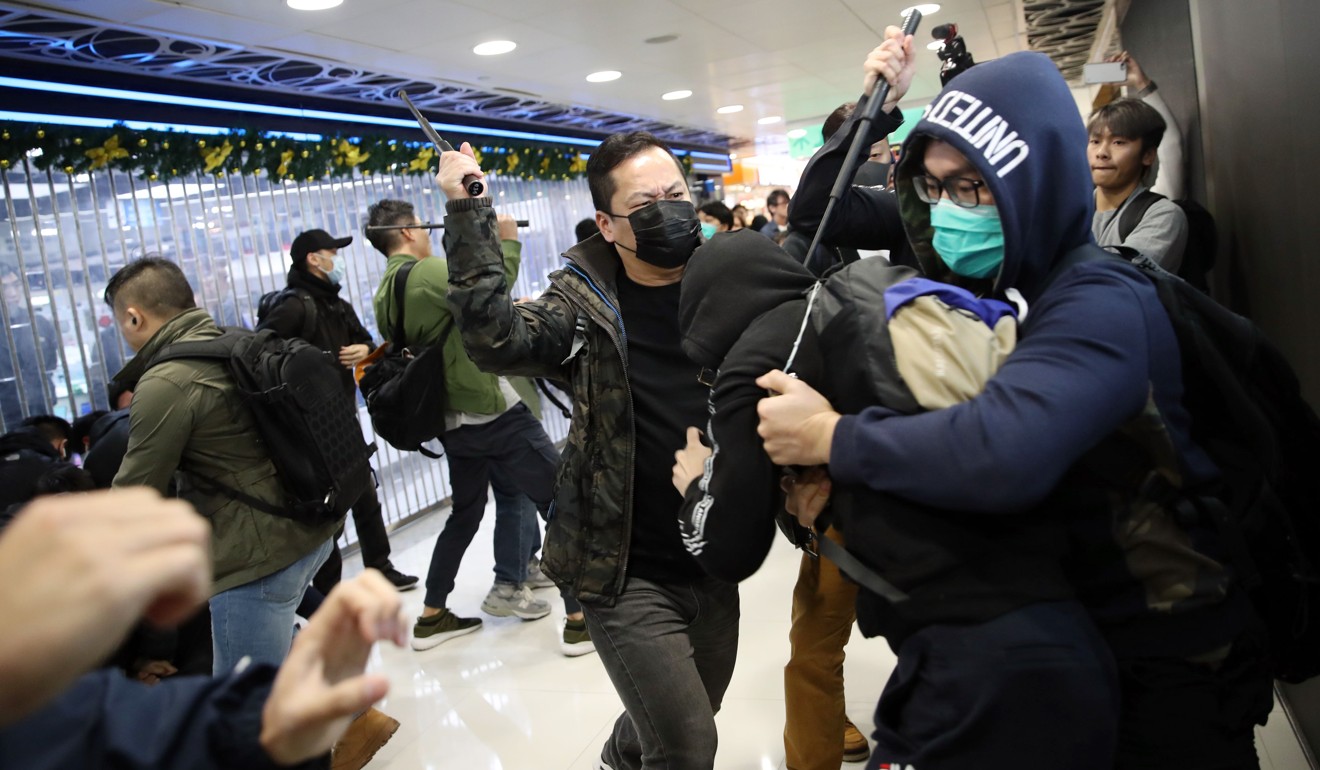
“One country, two systems will never be accepted in Taiwan. It is impossible,” he said. “But what I see is that Taiwan has been becoming Hong Kong already.”
He said Beijing had stepped up the “united front work” in Taiwan, infiltrating different businesses and even pouring money in to help Han’s campaign bid.
Murder suspect Chan is awaiting the outcome of the elections too.
Reverend Canon Peter Koon Ho-ming, a top Anglican priest who played a key role in persuading him to surrender to Taiwan authorities, told the Post recently he still intended to surrender and would do so at an appropriate time.
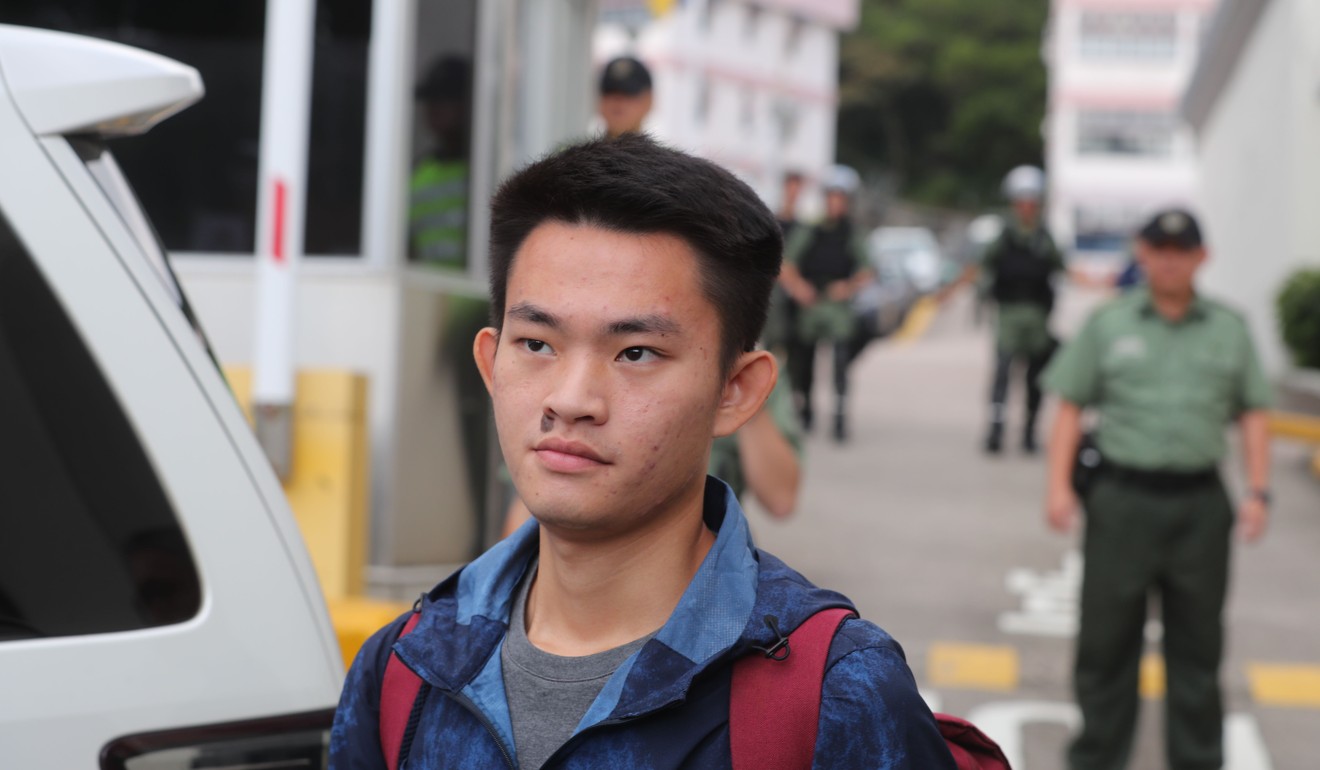
For Hong Kong lawyer Wong, Tsai’s victory would mean a better future for the Hong Kong protesters taking refuge there.
To get them back on their feet for now, Wong plans to set up non-profit shops that will hire them, starting with a restaurant with an initial capital of HK$200,000 (US$26,000).
“Hongkongers are not begging for sympathy. We can take care of our own comrades and they will not become a burden for Taiwan people.”
Additional reporting by Gary Cheung
This is the fourth part in our series on Taiwan’s election. Read the first part, on the crucial role young and first-time voters are expected to play, here, the second part, on Han Kuo-yu’s uphill task, here, the third part, on Tsai Ing-wen’s turnaround, here, and the fifth part, on how relations between Beijing, Taipei and Washington are affecting the poll, here.


